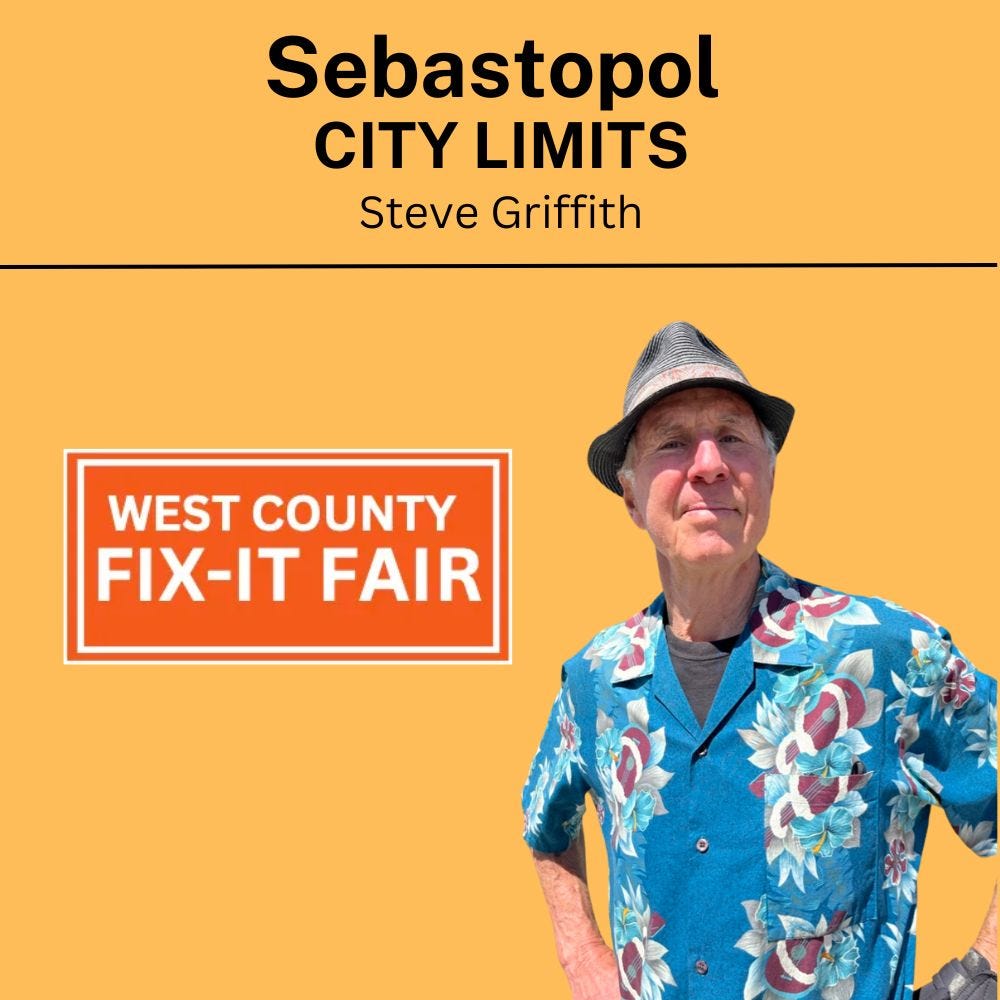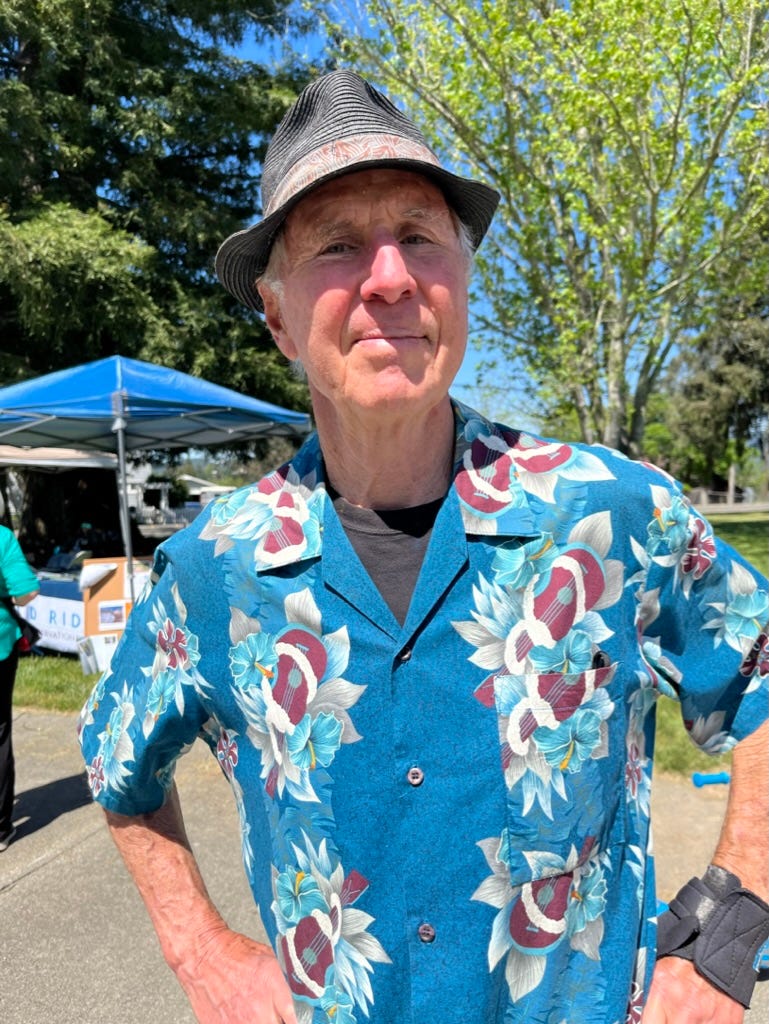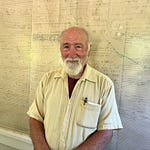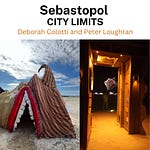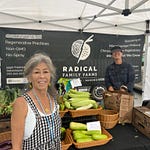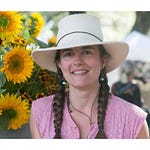Steve Griffith is a former elementary school teacher who moved to Forestville about 10 years ago. Wanting to do an event for the West County community, he proposed to the Russian River Rotary Club that they sponsor a Fix-it Fair at the El Molino campus in Forestville. They agreed and the Fair took place April 29.
I talked to Steve before and after the event to learn more about how he organized the event developed as well as to talk about how we can and should repair more of what we own instead of just throwing it away. Steve was also proud to hold the event at the El Molino campus.
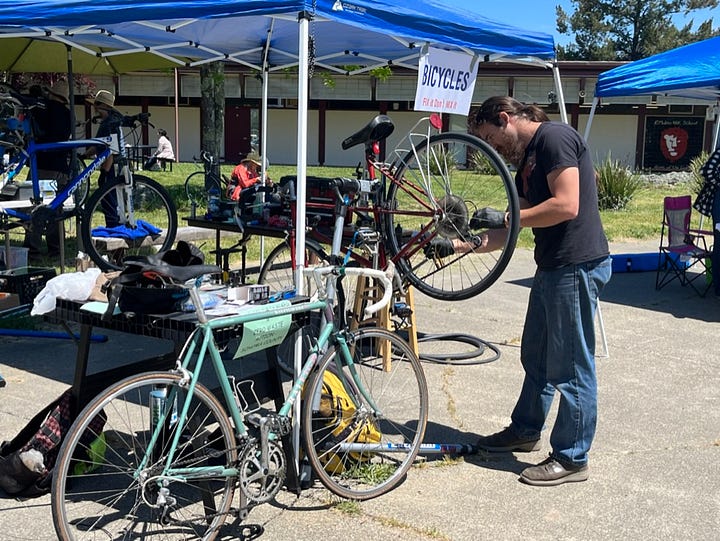
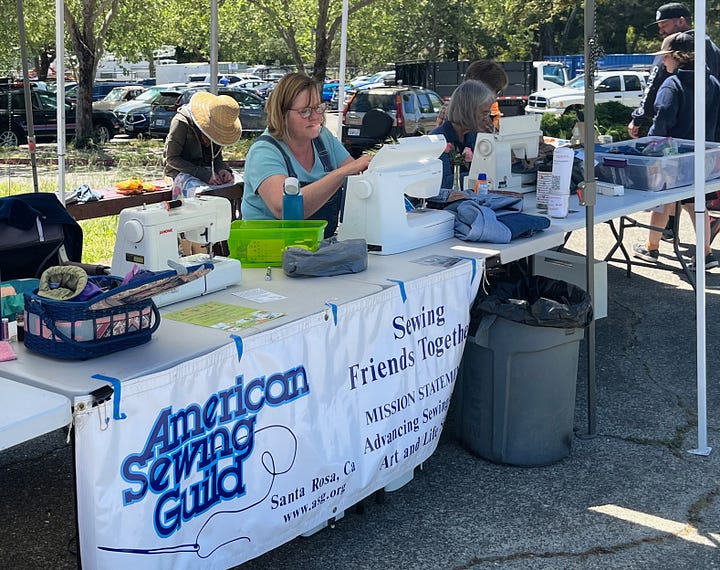
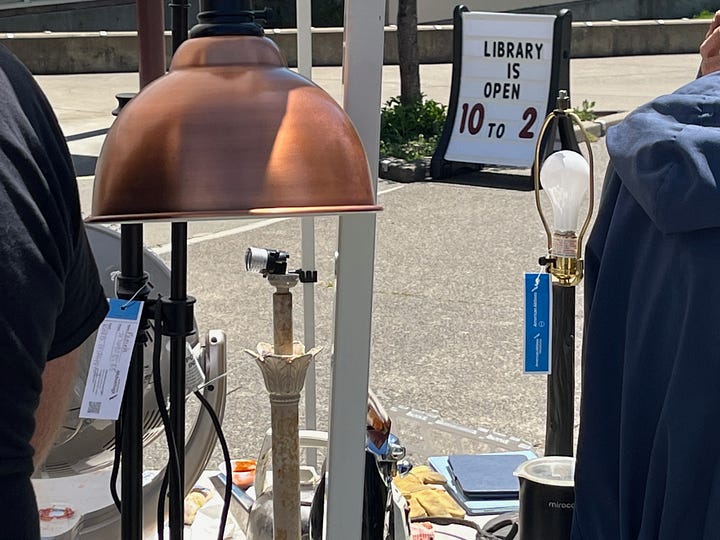
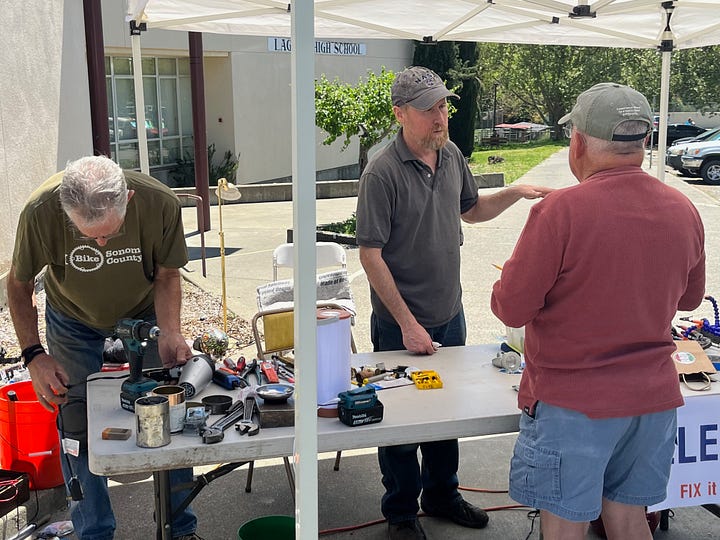
Transcript: Mr. Fix-it
Steve: Moved to Forestville 10 years ago, coinciding with my retirement as a elementary school teacher in Daly City. We moved up here from San Francisco because my wife wanted to garden and farm, which she does in a mighty way and grows half the food we eat.
I'm pretty much on track for sustainability in all manners and shapes and forms, but going way back to my days in elementary school teaching, I made it a mission of mine to develop what had been a non-existent recycling program at my school.
I would take my second or third or fourth graders on field trips down to the landfill / recycling yard and display of recycling, right? And trying to make a fun game out of bringing no waste lunches. Okay, now, okay, open your lunch. What do you go? Oh man, you got that wrapped in plastic. I'm sorry. That's one demerit on that. So tried to get a hundred percent of no waste lunches while we were touring the landfill, et cetera.
So I've always been interested in terms of education and youth and giving instruction and setting good examples.
Now, prior to that teaching career, I had been a working musician and a carpenter- remodeler to make the money I didn't make playing music. I was always trending towards rehabbing and restoring, and fixing buildings, remodeling. Never new-- just was not interested.
I took it to the point of buying a house at the CalTrans auction and moving it across town up in Eureka California and reestablishing it on a new lot, a Queen Anne Victorian. We paid $250 for it, but we had to move it and put it on a new lot. My friend and I worked on that house, learning a lot along the way for about, geez, a year and a half. It took us a long time. Then we sold it.
So then I had some money in my pocket to move to San Francisco and not have to scuffle so much. And lo and behold, within an year of moving to San Francisco, I found another house that was a prime candidate for being moved because it was obviously slated for demolition.
So I've always been interested in "fix, don't nix it."
Dale: I wanted to know where the idea of a Fix-it Fair came from.
Steve: I saw other events like Zero Waste Sonoma and a woman named Portia Sinnott collaborated on a Fix-it Day in Santa Rosa about a year ago -- sharpening service, clothes repair, bicycle repair and maintenance. Those were the three biggies that they had, and they had the bookmobile and a little clothing swap. People could bring what they didn't want and take what they do want.
Tek Taylor sponsored the event in their parking lot. He's a very interesting guy. He's made a career out of repurposing and refashioning vinyl into gym bags and wallets and purses. What I love about him is that he takes decommissioned fire hose from Cal Fire. So you buy a belt made out of the hose that was used to fight the Tubbs fire.
Dale: You got the idea that West County needed some event like this?
Steve: I originally approached Russian River Rotary who is sponsoring this event. Their president came with me to that Fix-it day to see it. She was impressed and thought this is something our club could do.
Dale: How do you describe this and who are you trying to get to come out?
Steve: Everybody that has that thing in their house, in their yard, that they intend to get around to fixing. But they can't quite bring themselves to throw it out yet. So that's those people. For me and most people that might not view it this way on the surface, but it serves the purpose of keeping the working with hand tools a lot.
The people that I'm trying to engage is anyone who in the back of their mind goes, yeah, somebody is still doing that by hand. It doesn't just come from Home Depot.
Dale: We used to have in our small towns, people that did this regularly. Tailors and TV repair people and other kinds of shops that you could go and take your thing to and get it done by a professional.
Steve: Absolutely. So in the absence of that being as prominent or easy to find now, I gotta tell you that I searched high and low and I made a bunch of inquiries to a bunch of places I could not find a leather repair person.
Dale: This is a skill set that's gone missing. Also certainly those people may have aged out but we buy things and throw them away quite easily. We don't expect things to last very long. don't.
Steve: It has become that way.
Dale: There's people in the community that can help other people fix something, or tell you that it can't be fixed. So how did you find all these people in the community,?
Steve: Three of them that are gonna be there at this event are my neighbors. One of them is a retired IT guy from El Molino High School, Mark Ballard. So I recruited him; he was a professional. The other two are what the word is successful "artisanal tinkerers."
My next door neighbor is gonna be there for the small electric repairs, although he can take apart and reassemble a computer. He also installed his own on-demand hot water heater and so forth. The guy that is one of the two woodworkers at the wood repair station is another neighbor who makes his living mostly doing woodwork and this little side of concrete. If you saw the hobby horse he built out of layers of laminated wood for his granddaughter, you'd weep. It's just, wow. Labor of love is capital L in that case. There's Hillel Posner who I immediately made a connection with the first time we met. He's helped me with some woodwork that I'm not good at. So I recruited him and he was right from the get-go: oh, I'm in a 100%. I started with people that I know and that I trust. One of the metal repair guys is my daughter's classmate from El Molino High School, who's now 25 and a very accomplished metal worker, whether it's braising or bronzing or soldering or welding.
The other metal worker could just as well be on the woodworker side. He's a contractor that helped me build my room addition and we've bonded over the years. Others came from Portia Sinnott recommending names and if they couldn't do it, I asked them who else they could recommend. I'm pretty fearless at asking for things. To be a good teacher, you better not be shy. Likewise, Sloane Pagal with Zero Waste Sonoma. It is just like the ripples of my inquiries. I just had to keep throwing the stone in the water.
Dale: Like Antiques Roadshow, but bring something that you wanna have looked at and say you need to go talk to the metal guy, or that's an electrical problem. Go over there.
Steve: That's right.
Dale: it could be a vacuum. It could be a
Steve: Musical amp. Table fan. Lamps. Lots of lamps.
Dale: This is probably a great place to just watch other people do this and learn from them and maybe even get a chance to do some of it yourself.
Steve: Someone will be there with their lamp and then they'll go: oh, huh. I could have brought that patio chair, or that sculpture that the wing of the dove fell off. I could have brought that.
I really wanted a wide spectrum of the crafts and arts of skilled repair people up to and including the tech issues. So I'm hoping that I get to be sort of a proud ringmaster.
Dale: This is at El Molino.
Steve: Oh, that's a second major part. Oh yeah. Let's remind West County what a cool jewel of a school facility we still have here that is being criminally underused. Let me share an anecdote with you.
Dale: Sure.
Steve: My daughter's 25, pretty powerful person. We moved up here when she was transitioning from middle school to high school. We chose to buy and relocate very much with an eye towards really appreciating El Molino and the principal Doria Trombetta and the dance program. Part of why she's a powerful person is she was empowered by some really wonderful mentors who were not just dancers, but you know, personalities. She starts going to ElMo and at first she's a little dismissive of the hicks, really. But in the end, if you talk to her now, just the other night, she was talking about, listen, I gotta tell you boys, that for dating material, you gotta know how to do shit. Up here, the boys know how to do shit, whether it's hooking up the trailer to the hitch or fixing the flat tire, stereotypical, right? She really came to a broader appreciation. She thought she was pretty hot stuff in San Francisco and she was, right. She ended up being student body president at ElMo, besides being the rally commissioner and the dance captain and then just for to be on a team in her senior year with a complete full program of AP classes, she decided she was gonna be on the swim team for a semester, which meant getting up at 5:30am to go Ives pool. Elmo provided all that. Elmo was small school culture, big school opportunities.
Okay, so now my daughter graduated with honors from Cal Berkeley. May 6th, she starts at Six Rivers National Forest. Fire crew, a certified wild land firefighter.
She discovered in the course of something else, this interest in reducing, in her case it was doing GIS mapping of fuel loads for Sonoma County residents with property owners with three acres or more, and she discovered indigenous practices and the folly of suppression of fire at all costs. So she's putting her boots where her mind is. It's really something.
Dale: The Fix-it Fair took place at El Molino on April 29th. A week after, I talked to Steve again.
How'd you think it went?
Steve: I was pretty pleased with the turnout, both on the fixer side, the volunteer side, the community group side, and thank goodness the attendant public side.
Dale: Good.
Steve: I think there's lots of improvements or things that can be done for a repeat performance that would boost the entire proceedings. Starting with trying not to conflict, not scheduling, going head to head with with a) prom night and b) the Apple Blossom Fair. Those were two biggies.
Dale: We have so many events that there are conflicts. Two years ago we didn't have any events at all.
Steve: It's a lovely area to live in with those kinds of events happening,
Dale: So I saw a lot of lamps. A lot of people walking in with different lamps, as you suggested. Did you see anything really unusual that was getting repaired?
Steve: Let's see. There was a memorable interchange with a gentleman who had a collapsible tent that he and the wood workers and the metal workers could not help in the end get it either unfolded into its proper form or refolded into what it was supposed to be. There was a lot of items that were not in your standard categories. But I did enjoy seeing the lamps being walked across the site. I enjoyed seeing bicycles being wheeled in. Somebody had what looked like a big brass urn. My own watering can proved to be un- weldable. Darn it.
Dale: Darn it.
Steve: But we kept six sewers occupied.
Dale: I ran into some people that had dropped off clothing. That's very nice.
Steve: Absolutely. There was a nice wide variety. The tech issues booth was a little underutilized, especially there were two tech helpers. One of them specializes in Mac. He's the retired IT resource teacher from El Molino. He didn't have as much to do as his partner, the "Geek Girl." I ran into her three days ahead of the event at the local Forestville Sunshine Roasters coffee shop. I saw the side of her van completely emblazoned with the Geek Girl.
I said, oh my goodness, I've gotta make this acquaintance. Asked her if she would be willing to participate or if she was free. She said, okay. Yeah, that sounds good.
Dale: She told me she got about eight or nine referrals of work she couldn't do there. People wanted to talk to her later on.
Steve: Oh, she had to send her boyfriend home to get a new supply of business cards. Next time we would like to emphasize individual fixers, being sure if that is what they're interested in to get other customers or business for their normal operations. Many of them are retired and aren't seeking that. But there's some that are.
Dale: The Russian River Rotary was all there. They were really good helpers and talking to people.
So you think you'll bring it back next year?
Steve: There's heavy requests for that. The meeting of the Russian River Rotary the following Tuesday was all about trying to pick a date that wouldn't conflict with those items we just talked about.
Thank goodness the wheel is invented and can be rolled much more easily next time. It was a lot of hours to corral and enlist and recruit and arrange all those we had. I just sent the note to my son. I added up. We had 24 different fixers spread out between nine booths about an equal number of volunteers including the Rotary and about 30 or more people at the information booths of the community groups. Added up to about 80 people putting this on.
Dale: Hats off to the fixers particularly that were there. They gave up their time. As you said, many of them are retired community people that just, they didn't know what necessarily they would get out of this, but they gave to the communities their talents and that's great.
Steve: It's true. We had some first timers for such an event. Frankly, the bike repair people and the sewing people, a lot of them are veterans, so to speak, of such an event. I love to see that.
I'll tell you something that I pitched to the Rotary and that is why not go ahead and have a more hyperlocal Fix-it Fair in Guerneville. Let's do a formally Lower River gathering spot. Let's let the community groups at that event be all Forestville, Guerneville, Monte Rio Jenner-- I think I would like to see that.
Dale: That's a good idea. This event could be done at different sizes or scale. It could be done lots of different ways.
Steve: No, it's true.
Dale: I just wanna credit you -- even if people didn't come and even if they just saw the signs there it helps plant in their brain that this can be done, that things can be repaired. And that's a really important message.
Steve: I agree. It needs to be a widespread message, something that people see around more than just once. Yeah, absolutely. I know that Zero Waste Sonoma and Portia Sinnott are planning one in July, I believe, in Santa Rosa, maybe.



